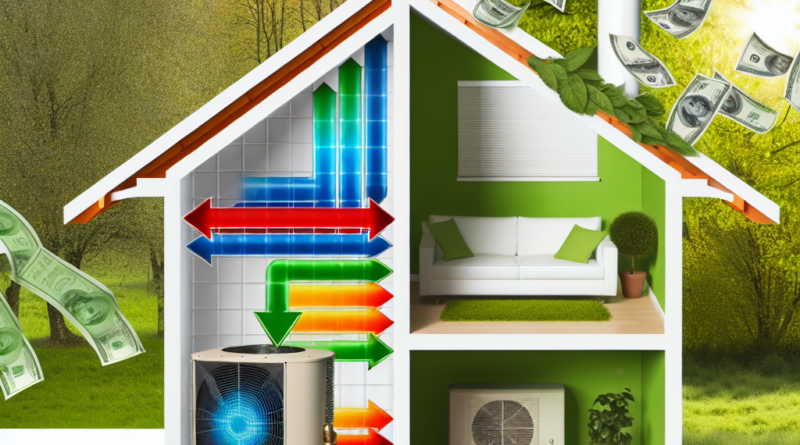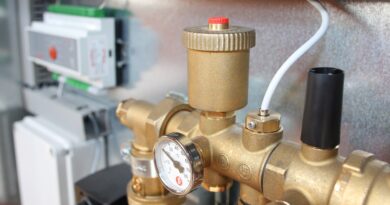Cutting Energy Costs: How Heat Pumps Can Save Money and the Environment
-
Table of Contents
Introduction
Cutting energy costs is a pressing concern for homeowners and businesses alike, especially in an era of rising energy prices and increasing environmental awareness. Heat pumps have emerged as a viable solution, offering an efficient alternative to traditional heating and cooling systems. By transferring heat rather than generating it, heat pumps can significantly reduce energy consumption, leading to lower utility bills. Additionally, their ability to utilize renewable energy sources contributes to a decrease in greenhouse gas emissions, making them an environmentally friendly choice. This introduction explores how heat pumps not only provide substantial savings on energy costs but also play a crucial role in promoting sustainability and reducing our carbon footprint.
Heat Pumps: An Overview of Energy Efficiency
Heat pumps have emerged as a pivotal technology in the quest for energy efficiency, offering a sustainable alternative to traditional heating and cooling systems. By transferring heat rather than generating it through combustion, heat pumps can significantly reduce energy consumption and lower utility bills. This innovative approach not only benefits homeowners financially but also contributes to environmental sustainability by decreasing greenhouse gas emissions.
At their core, heat pumps operate on a simple principle: they move heat from one place to another. In the winter, they extract heat from the outside air, ground, or water and transfer it indoors, while in the summer, the process is reversed, removing heat from the indoor environment and releasing it outside. This dual functionality makes heat pumps an attractive option for year-round climate control. Unlike conventional heating systems that rely on fossil fuels, heat pumps utilize electricity, which can be sourced from renewable energy, further enhancing their eco-friendly credentials.
One of the most compelling aspects of heat pumps is their remarkable efficiency. The efficiency of a heat pump is often measured by its coefficient of performance (COP), which indicates the ratio of heating or cooling provided to the energy consumed. Many modern heat pumps boast a COP of 3 or higher, meaning they can produce three units of heating or cooling for every unit of electricity consumed. This efficiency translates into substantial cost savings on energy bills, making heat pumps an economically viable option for many households.
Moreover, the installation of heat pumps can lead to long-term financial benefits. While the initial investment may be higher than that of traditional heating systems, the reduced operational costs often result in a quick return on investment. Additionally, various government incentives and rebates are available to encourage the adoption of energy-efficient technologies, further offsetting installation costs. As energy prices continue to rise, the financial advantages of heat pumps become increasingly pronounced, making them an attractive choice for budget-conscious consumers.
Transitioning to heat pumps also aligns with broader environmental goals. As the world grapples with climate change, reducing reliance on fossil fuels is imperative. Heat pumps, particularly when powered by renewable energy sources such as solar or wind, can significantly lower carbon footprints. By decreasing the demand for natural gas, oil, and coal, heat pumps contribute to a cleaner energy landscape. Furthermore, as more households adopt this technology, the cumulative effect can lead to a substantial reduction in overall energy consumption, fostering a more sustainable future.
In addition to their environmental benefits, heat pumps offer enhanced comfort and convenience. Many models come equipped with advanced features such as smart thermostats and zoning capabilities, allowing homeowners to customize their heating and cooling preferences. This level of control not only improves comfort but also optimizes energy use, ensuring that energy is not wasted on unoccupied spaces.
In conclusion, heat pumps represent a forward-thinking solution to the challenges of energy efficiency and environmental sustainability. Their ability to provide effective heating and cooling while minimizing energy consumption makes them a wise investment for homeowners looking to cut costs and reduce their ecological impact. As technology continues to advance and awareness of climate issues grows, heat pumps are poised to play a crucial role in shaping a more energy-efficient and environmentally friendly future. By embracing this innovative technology, individuals can contribute to a collective effort to create a sustainable world while enjoying the financial benefits that come with it.
Cost Savings: How Heat Pumps Reduce Utility Bills
As energy costs continue to rise, homeowners and businesses alike are increasingly seeking effective solutions to reduce their utility bills while also minimizing their environmental impact. One of the most promising technologies in this regard is the heat pump, which offers a dual benefit of cost savings and energy efficiency. By understanding how heat pumps operate and their advantages over traditional heating and cooling systems, consumers can make informed decisions that not only enhance their comfort but also contribute to a more sustainable future.
Heat pumps work by transferring heat rather than generating it through combustion, which is a common method used in conventional heating systems. This process allows heat pumps to provide both heating and cooling, making them versatile for year-round climate control. During the winter months, heat pumps extract heat from the outside air, ground, or water and transfer it indoors. Conversely, in the summer, they reverse the process, removing heat from the indoor environment and releasing it outside. This efficiency is a key factor in their ability to reduce utility bills.
One of the most significant advantages of heat pumps is their high coefficient of performance (COP), which measures the ratio of useful heating or cooling provided to the energy consumed. Many modern heat pumps can achieve a COP of 3 or higher, meaning they can produce three units of heating or cooling for every unit of electricity consumed. This efficiency translates directly into lower energy bills, as homeowners can maintain comfortable indoor temperatures without relying heavily on electricity or fossil fuels.
Moreover, the installation of heat pumps can lead to substantial long-term savings. While the initial investment may be higher than that of traditional systems, the operational costs are significantly lower. Over time, the savings on utility bills can offset the upfront costs, making heat pumps a financially sound choice. Additionally, many regions offer incentives, rebates, or tax credits for the installation of energy-efficient systems, further enhancing the financial appeal of heat pumps.
In addition to direct cost savings, heat pumps also contribute to a reduction in greenhouse gas emissions. By utilizing renewable energy sources and reducing reliance on fossil fuels, heat pumps play a crucial role in decreasing the carbon footprint of residential and commercial buildings. This environmental benefit is increasingly important as society grapples with the effects of climate change and seeks sustainable solutions. By choosing heat pumps, consumers not only save money but also participate in a broader movement toward environmental stewardship.
Furthermore, the versatility of heat pumps allows for various applications, including air-source, ground-source, and water-source systems. Each type has its unique advantages, making it possible for consumers to select a system that best fits their specific needs and geographical conditions. For instance, ground-source heat pumps, also known as geothermal systems, can be particularly efficient in areas with stable underground temperatures, providing even greater energy savings.
In conclusion, heat pumps represent a compelling solution for those looking to cut energy costs while also making a positive impact on the environment. Their ability to efficiently transfer heat, coupled with their long-term cost savings and reduced carbon emissions, positions them as a smart investment for homeowners and businesses alike. As the demand for energy-efficient technologies continues to grow, heat pumps stand out as a viable option that aligns economic benefits with environmental responsibility, paving the way for a more sustainable future.
Environmental Benefits of Switching to Heat Pumps
The environmental benefits of switching to heat pumps are significant and multifaceted, making them an increasingly attractive option for homeowners and businesses alike. As the world grapples with the pressing challenges of climate change and the need for sustainable energy solutions, heat pumps emerge as a viable alternative to traditional heating and cooling systems. One of the primary advantages of heat pumps is their ability to transfer heat rather than generate it through combustion. This fundamental difference means that heat pumps can operate with remarkable efficiency, often achieving a coefficient of performance (COP) that exceeds 3.0. In practical terms, this means that for every unit of electricity consumed, heat pumps can deliver three or more units of heating or cooling, thereby reducing overall energy consumption.
Moreover, the reduced energy demand translates directly into lower greenhouse gas emissions. Traditional heating systems, particularly those reliant on fossil fuels, contribute significantly to carbon dioxide emissions, which are a major driver of global warming. In contrast, heat pumps can be powered by renewable energy sources, such as solar or wind power, further diminishing their environmental footprint. When coupled with renewable energy systems, heat pumps can operate with little to no associated emissions, making them an essential component of a sustainable energy future.
In addition to their efficiency and reduced emissions, heat pumps also contribute to improved air quality. Traditional heating systems often rely on combustion processes that release pollutants into the atmosphere, including particulate matter and volatile organic compounds. These emissions can have detrimental effects on both human health and the environment. By eliminating combustion, heat pumps help to mitigate these harmful emissions, resulting in cleaner air and a healthier living environment. This is particularly important in urban areas, where air quality is often compromised by traffic and industrial activities.
Furthermore, the adoption of heat pumps can lead to a decrease in the demand for fossil fuels, which are not only finite resources but also subject to volatile market fluctuations. By reducing reliance on these fuels, heat pumps contribute to energy independence and security. This shift not only benefits the environment but also promotes economic stability by insulating consumers from the impacts of rising fuel prices. As more individuals and businesses transition to heat pumps, the collective demand for fossil fuels diminishes, paving the way for a more sustainable energy landscape.
Another noteworthy environmental benefit of heat pumps is their versatility. They can be used for both heating and cooling, which means that they can replace multiple systems in a building. This dual functionality not only simplifies maintenance but also reduces the overall energy consumption associated with operating separate heating and cooling systems. Additionally, heat pumps can be integrated into existing infrastructure, making them a practical choice for retrofitting older buildings, thereby extending their lifespan and enhancing their energy efficiency.
In conclusion, the environmental benefits of switching to heat pumps are profound and far-reaching. By offering a highly efficient alternative to traditional heating and cooling systems, heat pumps not only reduce energy consumption and greenhouse gas emissions but also improve air quality and promote energy independence. As society continues to seek solutions to combat climate change, the transition to heat pumps represents a critical step toward a more sustainable and environmentally friendly future. Embracing this technology not only makes economic sense but also aligns with the broader goal of protecting our planet for future generations.




